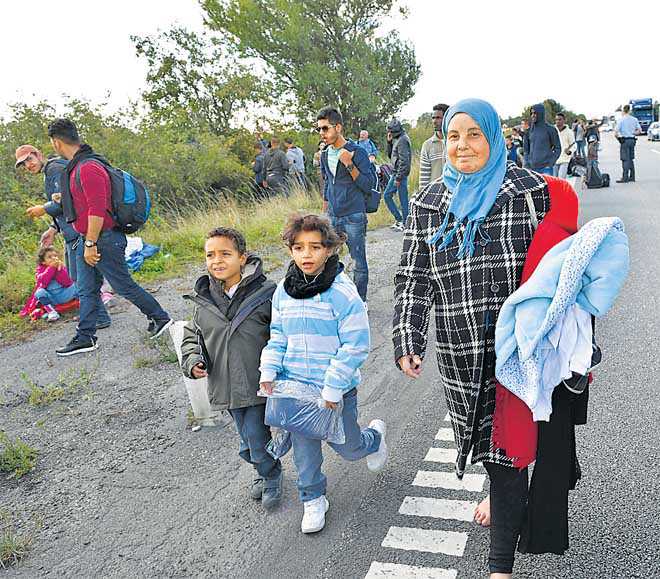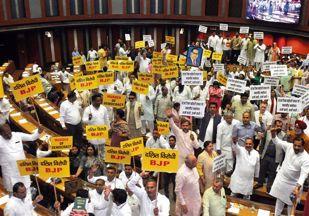
Since 2014, over half a million Syrian refugees have applied for asylum in Germany. AfP
Trivun Sharma
Student of PhD in international relations, University of Warsaw, Poland
Germany’s decision to not participate in the air strikes conducted by the USA, France and the United Kingdom over the alleged use of chemical weapons by the Assad regime in the Syrian town of Douma has raised eyebrows over Berlin's role in the transatlantic partnership. The decision comes at a time when Europe is faced with myriad challenges in the form of Brexit, refugee crisis, the rise of anti-EU and anti-immigration political parties, and lastly, Russia's hybrid warfare towards the West. Amidst such turbulence, Berlin's Syria policy is marked by pragmatism and realism based broadly on three deciding factors, namely, core principles of foreign policy, domestic politics; and Berlin's relationship with Moscow.
Berlin's approach towards Syria is characterised by finding a peaceful solution to the civil war. Since the cold war, 'pacifism' has been the guiding principle of Germany's international relations and the Syrian question is a litmus test for Berlin's diplomatic resolve. The complexities of the Syrian crisis arising over the involvement of multiple regional and extra-regional parties have strengthened the counterproductive assumptions on military means. Evidence of this is the increased rate of immigration and terrorist attacks in European cities like Paris, Berlin, Nice, London and Brussels. Therefore, Berlin's engagement with Syria is defined by a need for peace and stability in EU's southern neighbourhood, and not so much by the idea of 'regime change'.
Where German complicity to military involvement in Syria is noticed, it has been minimal and, mainly a result of requests by EU member nations. On invocation of the EU Treaty's Mutual Defense clause, after the Paris attacks of November 13, 2015, Germany supported the international coalition forces in fighting the ISIS in the Middle East. Berlin approved the deployment of 1200 Bundeswehr soldiers along with 6 Tornado surveillance jets, aircraft for aerial refueling of French fighter jets, a frigate to protect France's aircraft carrier Charles de Gaulle, as well as satellite data. The Bundestag also sent around 650 troops to the UN mission in Mali to support French troops.
The primary impetus for Berlin's military deployment was solidarity towards allies, particularly France, and to defeat the ISIS in Iraq and Syria. With recent setbacks faced by the ISIS against Russia and Assad in Syria; and, against the US and the Iraqi government in Iraq, Berlin's central objectives to use military prowess have been achieved. The next objective, ergo, for Berlin is to achieve stability in Syria in order to contain terrorism in Europe and facilitate the return of the refugees. The latter is largely driven by Germany's domestic political dynamics.
The refugee crisis has become the single largest threat to Chancellor Angela Merkel's popularity at home. The September 2017 federal elections revealed the rising popularity of the Alternative for Germany Party (AFD), which principally campaigned on anti-immigration and anti-Islam. The election results culminating in AFD winning 94 seats, despite Merkel's overall victory, have drawn attention to the rising nationalistic fervor, which is opposed to immigration and refugee policies.
Since 2014, over half a million Syrian refugees have applied for asylum in Germany. Such large numbers represent a two-fold challenge for Merkel. First, the domestic problem of resettlement and the closely linked problem of integration with the German society. Second, the inherent fear of the refugees becoming victims of terrorist propaganda. In other words, Germany's escalation of the Syrian offensive and enhanced military support to US-led operations, in Berlin's calculus, carry the risk of greater domestic repercussions. With growing popularity of AFD, Merkel could least afford to imagine such a scenario. Hence, military refrainment serves as a viable option.
Russo-German complexity
A key determinant of Berlin's Syria policy is her complicated relationship with Moscow. While the political and strategic relationship with western allies is critical to Berlin's foreign policy, it comes at the cost of an economic relationship with Moscow. In this regard, even if Angela Merkel spearheads the cause of economic sanctions against Russia over Ukraine, the administration makes sure that its important business interests with Moscow are not brought to risk. For instance, the Nord Stream II pipeline is an illustration of Berlin's determination to sustain and strengthen the economic relationship with Moscow.
The pipeline has been criticised by the US, Poland and Ukraine, for enabling Moscow to regain political dominance over energy supplies to Europe. However, for Germany, the pipeline serves as a lucrative means to secure her energy demands. Overlooking criticism, Germany has given approval to the section of the pipeline under its exclusive economic zone, showcasing economic dividends over collective western security concerns towards Moscow.
Thus, where the west wants Germany to stand against Russia, Berlin prefers the pragmatic approach of economic engagement with Moscow. In this context, with regard to the Syrian question, the Merkel administration has made it clear, that although Russia poses a significant challenge to western liberal democracy through its asymmetric warfare, Berlin does not want to be in a situation where they are in a direct confrontation.



























